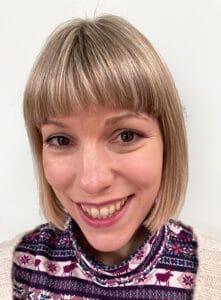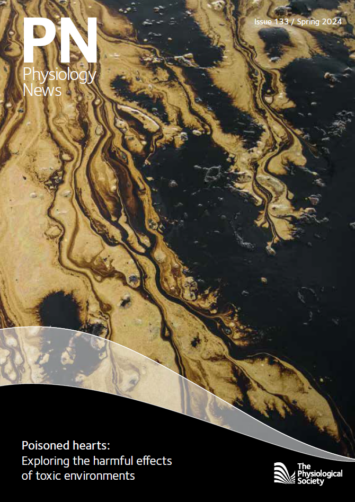
Physiology News Magazine
Editorial
New eras: The excitement, trepidation and fortunes of change
Introduction
Editorial
New eras: The excitement, trepidation and fortunes of change
Introduction

Alanna Orpen
Media and Communications Officer, The Physiological Society
How do our stories begin and what fills the chapters along the way? In this Spring Issue of Physiology News magazine, our members, journal authors and community of physiologists around the world share their passions, and show us how their experiences propelled their varied careers; from treating patients living with mental health conditions to tackling environmental threats, we discover what drives each of them and how physiology is perfectly positioned to tackle big societal challenges.
Firstly, news from our community. Physiology News will be entering its own period of change. This will be the last print issue of Physiology News as the magazine will be re-launched this autumn as an online-only magazine. Lucy Green, Trustee and Chair of Communities Committee, explains what you can expect from a new, online member magazine (p.7).
Last year, Experimental Physiology transitioned from being a subscription journal to a Gold Open Access Journal. On p.12, Lucinda Periac-Arnold, Head of Publishing at The Society, looks back at Experimental Physiology’s first year as a Gold Open Access journal, sharing the opportunities and challenges of this new and exciting landscape for our authors and the physiological community.
Also, in the field of publishing, preprints could be a game changer for physiology research. Sandra Franco-Iborra and authors from ASAPbio, US, wish to raise awareness of this innovation and encourage the community to embrace the open platform, explaining how preprints could amplify the impact of your research (pp.14-15).
Are we at a pivotal moment for helping those living with addiction? Professor Anders Fink-Jensen (Psychiatric Center Copenhagen, Denmark) a clinical psychiatrist working on treating and researching mental health conditions, has advanced the research into a particular group of compounds, called GLP-1 receptor agonists. In his interview on pp.24-27, he talks about how these compounds could offer a new hope for the development of anti-addiction drugs.
When it comes to matters of the heart, Dr Jennifer Reed (University of Ottawa Heart Institute, Canada) is concerned about the lack of programmes designed to meet women’s needs to reduce their risk of cardiovascular disease, a principal cause of premature death. On pp.16-19, meet the women working in exercise science and cardiovascular rehabilitation to prevent and treat cardiovascular disease in women.
How our heart and bodies respond to different training regimes, set Dr Aurel Leuchtmann (University of Basel, Switzerland) on a path to understand the molecular mechanisms behind the benefits of exercise. The search resulted in Aurel and his co-authors winning Physiological Report’s Paper of the Year 2023 (pp.28-31).
For our 2023 Rob Clarke Award winner, Anupa Sara Paulose (University College Dublin, Ireland), improving the outcomes of patients living with dementia is an issue that is close to her heart. In her article on p.41, she talks about how this personal connection with the disease fuels her ambition to join the global research efforts to combat the illness. Read our interview with Anupa to learn more about her undergraduate research project for the award.
On pp. 20-23, read our interview with Fellow Member, Professor Holly Shiels (University of Manchester, UK) as she warns of the damaging effect of fossil-fuel pollution on human hearts. Holly’s comparative physiology work on extreme environments has meant that a vulnerable link to pollutants shared by fish and human hearts led to quick action, calling for changes to public health guidelines.
Another warning call for action, is the ‘Red Alert’ article by Shania Pande, Policy Officer at The Society (pp.10-11). Learn more about the policy team’s climate and health project and their report calling for a national heat resilience strategy, a multidisciplinary approach rooted on physiological understanding to tackle extreme heat and protect vulnerable groups.
To increase the visibility of physiology and The Society, Dariel Burdass, Chief Executive of The Society informs us of The Society’s Royal Charter application (pp.8-9). Find out more about the steps to gaining this accolade and how it can enhance public trust in The Society and elevate member’s profiles, to name but a few of the benefits.
For those new to lecturing, help is at hand in the form of a series of video resources on our Training Hub. Professor Matthew Mason (University of Cambridge, UK) shares the topics and concepts covered by experts in the current set of videos to help you teach important and challenging areas (pp.38-39).
If you are looking for a grant, then turn to p.40 as Julia Attias, Membership Programmes Manager at The Society, tells you how to use our new Physiology Grants Directory. We hope it will be your ‘go-to’ place for finding physiology-related opportunities.
This issue of Physiology News demonstrates all of the fantastic ways in which physiology is improving human health and what better way to celebrate this than through our annual celebration ‘Physiology Week’. This ran in November last year and you can find out more about the global events that took place on pages pp.44-45. Continuing the theme of celebration, on p.42, we hear about the innovative, life-saving physiological research of the Extreme Environments Group at the University of Portsmouth. Their research has influenced global practices and policies, improving both athlete and occupational safety in extreme environments, for which they were presented with the inaugural Excellence in Physiology Award.
Catch-up with our events on pp.34-37, browse the meeting previews to gather with your community for those all-important networking and collaboration opportunities. Then the remarkable achievements of world-renowned leader in science, Professor David Brown are honoured in a tribute written by Professor Mala Shah (University College London, UK).
Without further ado, enjoy the issue beginning with Professor David Attwell and his review of events past, present and future in his President’s View on p.6.
